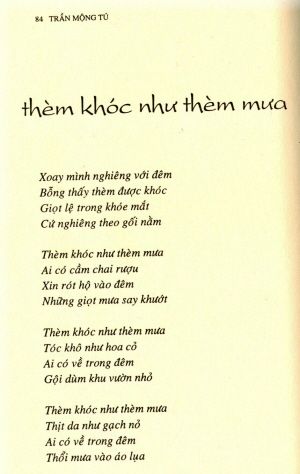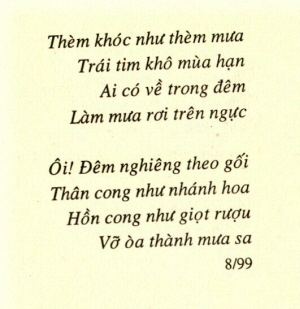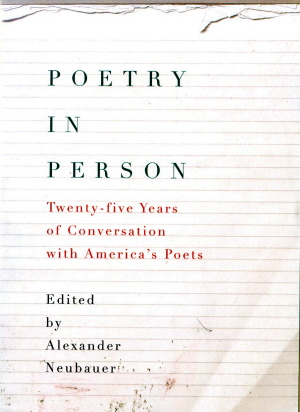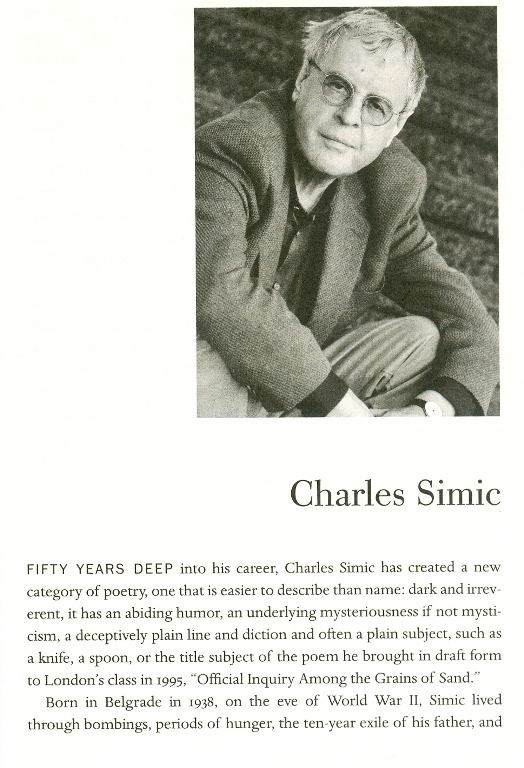 |
NOTHING ELSE
Friends of the small hours of the night: Stub of a pencil, small notebook, Reading lamp on the table, Making me welcome in your circle of light. I care little the house is dark and cold With you sharing my absorption In this book in which now and then a sentence Is worth repeating again in a whisper. Without you, there'd be only my pale face Reflected in the black windowpane, And the bare trees and deep snow Waiting for me out there in the dark. -Charles Simic NYRB Jan 13. 2011 Cần Gì Nữa Đâu Bạn
bè của những giờ nho nhỏ của đêm Không
có em, thì sẽ chỉ có cái bộ mặt xanh xao của anh   BOOK 23: ARTISTS AND MODELS BY ANAIS NIN February 18,
2008 Dear Mr.
Harper, Valentine's
Day was just a few days ago and we've had a long cold snap here in
Saskatchewan-two good reasons to send you something warming. Yours truly,
Yann Martel ANAIS NIN
(1903-1977) was born in Paris, raised in the United States and
identified
herself as a Catalan-Cuban-French author. Nin was a prolific novelist,
short
story writer and diarist, best known for her multi-volume Diary. She
was also
one of the greatest writers of female erotica, and is famous for her
affairs
with notable individuals including Henry Miller and Gore Vidal. Note: Ngày
Tình Nhân, đề nghị đọc liền một mạch ba bài trên. “Thèm khóc
như thèm mưa/ Thịt da như gạch nỏ/Ai có về trong đêm/Thổi mưa vào áo
lụa” “Mưa không ướt
đất”! Bài thơ mới của Charles Simic,
xuất hiện trên tờ NYRB mà không tuyệt sao? Nhưng tuyệt nhất là lá thư gửi thủ trưởng Canada, nhân Ngày Tình Nhân của nhà văn Canada, Yann Martel. Khi chúng ta
trần truồng, chúng ta chân thật. *
  Ed. Alfred
A. Knopf, NY, 2010 FIFTY YEARS
DEEP into his career, Charles Simic has created a new category of
poetry, one
that is easier to describe than name: dark and irreverent, it has an
abiding
humor, an underlying mysteriousness if not mysticism, a deceptively
plain line
and diction and often a plain subject, such as a knife, a spoon, or the
title
subject of the poem he brought in draft form to London's class in 1995,
"Official Inquiry Among the Grains of Sand." Born in
Belgrade in 1938, on the eve of World War II, Simic lived through
bombings,
periods of hunger, the ten-year exile of his father, and the
imprisonment of
his mother. "Hitler and Stalin conspired to make me homeless," he has
said. Not until he was in his mid-teens was his family reunited,
settling in
the United States. Simic began writing poetry as a high school student
in the
Chicago suburbs. One aim of
his poetry, Simic says, is "to restore strangeness to the most familiar
aspects of experience." To London he says that "the foundation of
poetry is based on chance," and as chance can run toward violence,
violence, too, is at an edge not far away. "Official Inquiry" and its
grains of sand run together with a snooping seagull of "a secret
government agency." But even as Simic describes line by line the making
of
the poem, he laughs when London suggests that he might have an overall
vision.
"No. No, I never had a vision," he says. "Sometimes awkwardness
is inevitable and important." Simic was
still making "Official Inquiry Among the Grains of Sand" at the time
of his visit. "Here's a little poem I'm working on," he wrote to her
weeks earlier. "This draft will change, so I'll have another version
when
I come." The poem eventually appeared in his 1996 volume, Walking
the Black Cat, a National Book
Award finalist and one of five books of poetry he published in the
1990S.
Simic, who has taught at the University of New Hampshire since 1973,
became the
U.S. poet laureate in 2007. Năm mươi năm
ăn nằm với thơ, Charles Simic đã tạo ra một thể loại thơ, mới, dễ miêu
tả hơn
là đặt tên cho nó: u tối, thiếu sự tôn kính, thường xuyên tưng tửng, bí
ẩn “chìm”,
nếu không muốn nói, thần bí; dòng thơ bằng phẳng đánh lừa người đọc;
lời phán,
và đề tài thường giản dị, như con dao, cái thìa, hay như tít bản nháp
bài thơ
mà ông mang vô lớp cho London coi, vào năm 1955: “Một cuộc điều tra
chính thức
giữa những hạt cát” Sinh tại
Belgrade 1938, đêm trước Đệ Nhị Chiến, Simic ‘đau đáu’ kinh qua bom
đạn, đói khát,
và 10 năm lưu vong của ông già và bà mẹ đi tù. “Hitler và Stalin, hai
thằng khốn
này đã âm mưu làm cho tôi thành 1 kẻ không có nhà ở”, ông đã từng nói.
Phải đến
khi ông được 15, 16 tuổi thì gia đình mới được đoàn tụ, và tái định cư
ở Mẽo.
Simic bắt đầu làm thơ khi học trung học ở vùng ngoại ô Chicago. Thơ tôi nhắm tái lập lại cái “kỳ kỳ cho hầu hết những sắc thái quen thuộc của kinh nghiệm”. “Cơ bản của thơ dựa trên cơ may, tình cờ”, và bởi vì cơ may thường chạy tới bạo động, thành thử bạo lực thì cũng ngay mép bờ, chẳng ở đâu xa. Và mặc dù ông làm thơ từng dòng, từng dòng, khi được hỏi, liệu ông có 1 viễn ảnh lớn, bao trùm lên nó, nhà thơ lắc đầu. Nô, tớ chẳng bao giờ có một viễn ảnh. “Đôi khi, cái sự lớ ngớ thì không thể tránh được, và nó thì quan trọng”
*
TALE A Prince was annoyed at always being occupied with perfecting vulgar generosities. He foresaw amazing revolutions in love, and suspected that his wives could come up with something better than complacency adorned with sky and luxury. He wished to see the truth, the hour of essential desire and satisfaction. Whether or not this was an aberration of piety, he wanted it. He possessed at the very least a rather broad human power. All the
women who had known him were murdered. What wanton pillaging of the
garden of
beauty! Beneath the saber, they gave him their blessing. He ordered no
new
ones.-The women reappeared. He killed
his followers, after the hunt or after drinking. -They all followed
him. He amused
himself with cutting the throats of thoroughbred animals. He torched
palaces.
He hurled himself on people and hacked them to pieces.-The crowds, the
golden
roofs, the beautiful beasts still lived. Is it
possible to become ecstatic amid destruction, rejuvenate oneself
through
cruelty! The people didn't complain. No one offered the support of his
own
opinions. One evening
he was galloping fiercely. A Genie appeared, of an ineffable, even
unfavorable
beauty. From his face and bearing sprang the promise of a multiple and
complex
love! of an unspeakable, even unbearable love! The Prince and the Genie
probably disappeared into essential health. How could they not die of
it? So
they died together. But this
Prince passed away, in his palace, at a normal age. The Prince was the
Genie.
The Genie was the Prince. Wise music
is missing from our desire. -From Arthur
Rimbaud's Illuminations (Translated
from the French by John Ashbery) Thèm khóc như
thèm mưa Thèm khóc như
thèm mưa Thèm khóc như
thèm mưa Ôi! Đêm nghiêng
theo gối Bốn khổ thơ chót, tuyệt. Hình ảnh "đêm
nghiêng theo gối", quái làm sao, làm Gấu nhớ tới Brodsky. Pages
full of women who are wet not because it's raining and men who are hard
not
because they're cruel. Em đã biết
tay anh chưa! "Thân cong như nhánh hoa"
thì Gấu hiểu, và tưởng tượng ra được, Thịt da như
gạch nỏ. Hình ảnh “đóm
nỏ hút thuốc lào”... đưa chúng ta
trở lại
với bài thơ của Akhmatova, như là 1 kết thức tuyệt vời cho những dòng
trên đây: THE LAST ROSE You will
write about us on a slant Bông Hồng Cuối Bạn sẽ viết,
nghiêng nghiêng, về chúng ta Tôi sẽ bay lên cùng khói từ giàn thiêu Dido Tôi sẽ khiêu vũ với Salome Và rồi lại bắt đầu với Joan trong giàn hỏa Ôi Chúa ơi! Người cũng biết đấy, ta mệt đến bã người Với ba chuyện làm xàm phục sinh, và chết, và sống, Lấy mẹ hết đi, cha nội, trừ CM – Hãy để cho ta cảm thấy sự mát rượi của món quà mà nàng mang tới!
|